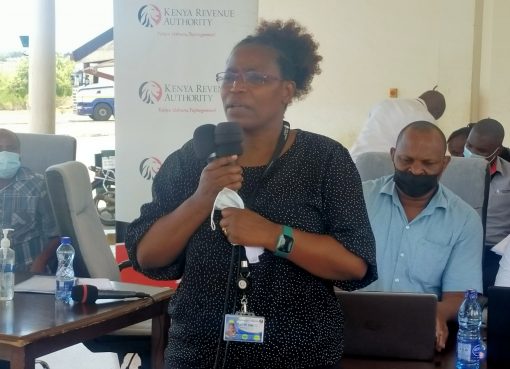Kenya Climate Smart Agriculture Projects got a Sh.300 million grant from the European Union (EU) aimed at scaling up climate smart agriculture in the country.
The EU Deputy Ambassador to Kenya Katrin Hagemann, said the funding is geared towards promoting farming as a business venture with emphasis on supporting environmentally sustainable farming practices.
Hagemann said the funding will go to 40 targeted smallholder farming groups spread in several counties that are involved in various climate smart agriculture projects such as farming, livestock keeping and fishing activities.
The envoy spoke in Kwale County during the launch of climate smart productivity project sub grants at Mwazaro beach where she stressed the EU’s commitment to help women and youth to gainfully invest in the blue economy sector by producing and distributing fish breeds.
She said the EU is committed to building resilience and reducing vulnerability to climate change in the country by supporting the Kenya Agricultural, Livestock and Research Organization (KALRO) research and dissemination projects of climate smart agriculture and technologies.
The EU Deputy Head of mission said the funding will in the long run allow smallholder farmers to scale up their businesses and move away from subsistence farming.
She said they are focused in supporting the recovery of the agriculture sector by strengthening climate resilience and adaptation of the farming systems through improved crop, livestock and fisheries management.
Amb Hagemann noted that climate risks to cropping, livestock and fisheries are expected to increase in coming decades particularly in countries where adaptive capacity is weaker threatening food security.
KALRO Director General (DG) Dr. Eliud Kireger says the country is highly vulnerable to the impact of climate change and thus they are working to deliver climate smart agriculture in a bid to sustainably increase productivity.
Dr. Kireger says they are promoting climate smart agriculture and technologies as the future of agriculture and a viable answer to climate change.
He said climate smart agriculture has the potential to increase productivity and resilience while reducing the vulnerability of smallholder farmers to the vagaries of the weather.
“Climate smart agriculture is a solution to help farmers to cope with the severe effects of climate change,” he said.
He said the fact that the country’s agriculture is mainly rain-fed means it is highly vulnerable to erratic and extreme weather conditions such as drought and flooding.
“Climate change is also to blame for food commodity fluctuations and crop and livestock pests and diseases,” he said.
Dr. Kireger said KALRO is working with farmers in the coastal counties of Kwale and Kilifi to better manage biodiversity conservation and fisheries resources.
He said by strengthening climate resilience and climate smart approach to farming will allow farmers improve their overall food security, nutrition and income.
He said currently KALRO is implementing a five year AgriFI CS APP with a grant of 5 million Euros from the EU and Sh.1.5 million from Kenya government to support its research on climate smart agricultural technologies and targets to reach 500,000 smallholder farmers, pastoralists and fisher folk.
He said the technology transfer model the project is using entails facilitating access to technologies, training of farmers and fisher-folks on new technologies and linkages to markets.
“The ultimate goal is to create jobs, improve incomes and ensure food and nutrition security” he said.
The KALRO DG says the project has targeted to create 50,000 jobs and so far 4,000 jobs with a total income of over Sh.10 million have been created mainly at farm level.
He said they are working towards facilitating farming systems that are more resilient to climate shocks and embrace climate smart practices that improve soil health and reduce land degradation.
He said the climate smart agriculture project seeks to increase productivity and build resilience to climate change risks in smallholder farming and pastoral communities by scaling up climate smart agricultural practices, strengthening research and seed systems and supporting agro- meteorological, market, climate and advisory services.
By Hussein Abdullahi





